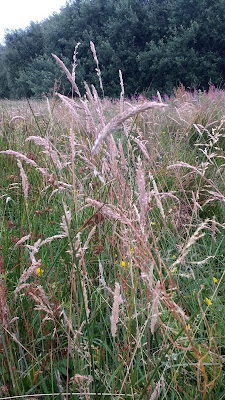Ripening in the sun
My method of working in the garden usually consists of darting
outside in between rain showers. That way I get a good indoor/outdoor balance.
It was so dry for so long this month that every day was an outdoor day.
We can relate to people in dryer climates that don’t need to
look at the weather forecast before the washing goes out. As nice as it is I do
find it quite unexciting and when I am in a queue I have very little to talk
about to people.
Working outside did get a bit relentless after the third
week and as my bald patch was glowing red I took on an inside job to stay out
of the heat. For a while now I have been
meaning to replace a wobbly floorboard in our back room.
Just one wobbly board
You know the story. One board turned to two then ten then all
the floor came up. The joists looked a bit ropey too as they have been down
there since the 1920’s, so they came up too. It’s amazing how the small room
grew in size when I started to work on it. Skirting came off next and on it’s
gone for nearly two weeks now. I do get moments of being completely overwhelmed
as I know the floor removal could spread even further to the hallway. I’m just
doing this room for now and hopefully as the rebuild goes on I will have a
feeling of achievement.
Oil or Varnish
I’m jumping forward to when the boards are down and think I
might go for a Danish Oil finish. It is more flexible than the polyurethane
varnishes and you can apply it with a cloth (after days of sanding which is a
job to do). It hardens after soaking in the wood and if it’s not hard wearing
enough it can be varnished over.
Danish Oil can also be
used on outside wood too although the wood I have to treat outdoors will need
something with a bit more preservatives in it I think. I have the shed to do at
some stage when the floor is done and this is untreated wood.
I don’t tend to treat any pressure treated wood that’s used
for either decking, fencing or raised beds as the wood is about as treated as
you can get. Any product put on top of this is generally only for aesthetic
purposes to either blend in with the garden or to hide the moss and algae. I do
get a bit of criticism for saying this but I have yet to be proved wrong. The wood is put into pressurized vats then
soaked in the preservative until it penetrates to the centre of the wood. No
amount of painting on a stain will do that.
A friend of mine has just put up a great fence and painted it green. It
does look great and will blend in with the shrubbery once planted so it all
depends on individual taste. I tend to go for the “Do Less” option.
There are eco friendly types of wood treatments you can get
and also some creosote substitutes for the bits below ground. There are a few
sound-alikes on the market such as Creocote and Creoseal which is like creosote
with all of the carconegens taken out. I couldn’t find any reviews about the
products at the moment as they are pretty new to the market and wood takes a
good few years to rot. You do still get the familiar creosote smell from it.
They should bottle that up as a deodorant, I’d buy it.
I’ve got the roof of the shed to recover with corrugated
bitumen at some stage but as the rain is threatening I’ll leave that until next
year.
Grasses are looking fantastic now. The hot, dry weather has
really brought on the ripening of the seed heads and the long brown stems are
waving gently in the breeze. There are so many great varieties of wild grasses -
10,000 at the last count. Many grasses are important crops (e.g. wheat and
rice); they also feed many grazing animals.
There are some larger familiar ones in gardens like Stipa gigantea,
miscanthus and pampas grass, but if you have a wildlife area put aside then
some smaller grasses could be used. Blue fescues, harestail grass, cotton grass
and common bent are all good choices. Look out for the Quaking Grass (Briza media) too as this is a great
novelty grass with its shaking seed heads.


No comments:
Post a Comment